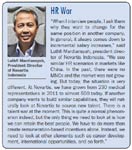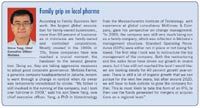Country Report: Indonesia
Ask Indonesians about a bad experience in medical care and each will have a story to tell. The poor state of Indonesia's healthcare system has turned "improving quality" into the top priority of the government of Indonesia. Better quality of care has become especially important as the fourth most populated country in the world moves forward with its plans to achieve universal healthcare coverage.
This sponsored supplement was produced by Focus Reports.
Project Director: Koen Liekens
Project Coordinator: Maria Elena Gomez
Project Publishers: Julie Avena
Contributors: Joan Abellan, Xenia Radu
For exclusive interviews and more info, please log onto www.pharmaboardroom.com
or write to contact@focusreports.net
Ask Indonesians about a bad experience in medical care and each will have a story to tell. The poor state of Indonesia's health care system has turned 'improving quality' into the top priority of the government of Indonesia. Better quality of care has become especially important as the fourth most populated country in the world moves into full traction with its plans to achieve universal health care coverage.

(SOURCE: ARTISANS OF BALI, HTTP://ARTISANSOFBALI.COM)
According to the Ministry of Health, 72 percent of the population, just over 176 million Indonesians, were already part of some type of health financing scheme. Now Indonesia's policymakers are committed to covering every citizen by 2019. The implementation of universal health care coverage will start in January 2014 and is widely seen as a significant step forward for Indonesia's 238 million people.
Badan Penyelenggara Jaminan Sosial, BPJS as the system is locally referred to, aims to drastically increase the quality and access to medicines and medical treatment to the entire Indonesian population. From policymakers to health care providers, drug manufacturers to distributors, all stakeholders in Indonesia's health care and pharmaceutical sector are now facing the critical task of defining their role within this changing environment.

Total Market
Most multinational companies (MNCs) do not expect to play a major role within BPJS but, despite the vast volume, serving BPJS will not be easy or cheap for local manufacturers either. Not only are they required to ramp up manufacturing capacity to serve a growing market, permits to manufacture –due to Indonesia's Pharmaceutical Inspection Convention and Pharmaceutical Inspection Co-operation Scheme (jointly referred to as PIC/S) adherence– have become stricter than ever.

Key Indicators Indonesia
Increasingly important within Indonesia's changing pharmaceutical landscape is the role of the distributor. Not only will distributors play a key role in making universal healthcare coverage a reality by physically making medical devices and medicines available across Indonesia's complex geography, they will also play an essential role in identifying where and how the market will benefit from BPJS by providing the manufacturer with the latest data from the field.

Courtesy of Sanofi
Promising macro-economic data, exponential growth rates, demographic potential, and a growing middle class have drawn Indonesia into the international spotlight, earning a place among the world's 'pharmerging' countries. Executives should not stare themselves blind on the double digit growth rate however. Indonesia remains a market where both MNCs and local pharmaceutical companies can enjoy steep growth curves-- provided they are willing to invest in the long run. These long term investments can take on various formats, including manufacturing, partnering, and brand building. All will be central to function as an agent of change while Indonesia heads towards universal health care coverage.

Dr. Nafsiah Mboi, Minister of Health
POOR CARE NO MORE
BPJS implementation ends an era of uncertainty around the government's commitment to launch universal coverage. Assigned as the chairman for the implementation of universal health care coverage in Indonesia is the country's Vice Minister of Health, Mukti Ali Ghufrom MSc, PhD. Ghufron and his team define government commitment as a key success factor to a successful implementation. "From a legal point of view, a law has already been formulated and launched. We have created a roadmap, together with all stakeholders, including the unions and the Chamber of Commerce, for the successful implementation of the plan. From a financial point of view, a budget has already been agreed upon: for 2014, an amount of IDR 1.75 trillion (USD 1.7 billion) will be provided to cover the poor and the 'near poor'," he said.

Eric NG, President Director - Sanofi
In parallel, increasing the quality of care is seen as equally important to the Ministry. "My main concern is the quality of our health care services. It would not make sense to provide health care to everyone in the country if its quality is poor," said Minister of Health, Nafsiah Mboi, Phd. "So far, we have been preparing rigorously to improve the quality of care. For health care facilities, our vision is a very strong primary care network combined with a good quality referral system." According to the Ministry, Indonesia now has roughly 9,500 primary care centers or one for every 30,000 people. "Although these numbers match the required standards, we need to work on improving the quality at primary care level," she said. "In terms of hospital care we now have 2,138 hospitals, 829 which are government owned, across the country. These hospitals have standards and accreditation which guarantee the quality of care that we need."

Parulian Simanjuntak, Executive Director - IPMG
FROM ROSE-COLORED GLASSES TO REALITY CHECK
MNCs are ramping up their sales force, a scarce resource, to serve a growing medical community at Indonesia's private hospitals, but they remain puzzled about public procurement opportunities to serve public hospitals and BPJS. "These companies are trying to understand what their place will be within the system," said Parulian Simanjuntak, executive director of the International Pharmaceutical Manufacturers Association (IPMG). "In order to contain cost, the government has already proclaimed that generics will be mainly used under the new plan. Therefore, the question arises whether the MNCs are allowed to participate in the generics business. "We would like more clarity on what exactly will happen with regards to the social insurance system. There should be no limitation as to who can participate in the universal health care plan." And even though Indonesia is the fourth most populated country in the world, big pharma still only touches a fraction of that market. Universal health care coverage, however, is expected to enlarge the patient base that can afford innovative medicines.

Dorodjatun Sanusi, Executive Director-GP Farmasi
"Today, just about half of the Indonesian population has some sort of access to health care insurance," said Eric Ng, president director of Sanofi Indonesia. "When you zoom into the situation however, you immediately see that the most advanced coverage is only provided for the civil servants through the Asuransi Kesehatan Indonesia (ASKES) program. Most of the MNCs primarily operate in this segment of the market, which at present only amounts to an estimated 20 to 30 million people. Universal health care coverage sometimes sounds exciting, but it may not be an opportunity for everyone. The plan targets a very basic package of health care based on low cost generics. However, we believe that the growing base of the population, which the government aims to cover in full by 2019, will serve as a driving force to increase the overall access to medicines. We believe that the base of the aforementioned 20 to 30 million people, which most of the MNCs target today, will theoretically increase to roughly 120 million people in 2014 alone. While we should not assume that our business will increase proportionally because of the price-volume effect, which implies that greater volumes will gradually push down the price of medicines, we do believe that Sanofi will have a much greater role to play in this country when such a large number of population requires access to medicines."

Johannes Setijono, Chairman-Kalbe Farma
PIC/S & PENNIES
When it comes to serving the generics-focused BPJS niche, Indonesia's local pharmaceutical companies are in a prime position. "These pharma companies will need to look at ways to increase their current capacity and ensure the readiness of their products," said Darodjatun Sanusi, executive director of GP Farmasi Indonesia, the association of generic drugs manufacturers. "At the same time, they have to find and sustain the competitive advantage of their products, particularly as the markets will open up more and barriers to trade will decrease,"

Filling the voids
If Indonesia's local manufacturers supply BPJS, they will also be the ones feeling the much expected price-volume effect. "It will change the whole landscape and turn Indonesia from a self-payers market into a government and private insurance-driven market," said Johannes Setijono, chairman of Kalbe Farma, the largest listed pharmaceutical company in the ASEAN region. "The private insurance companies, which are still small today, are therefore expected to see their bargaining power increase significantly. The plan is expected to not only drive up market volume but also create severe price pressures."

Erik Darius, President, Meprofarm
Two decades ago, one could already see several manufacturers moving out of the big cities and into industry-friendlier outskirts, moves that coincided with a government push to force GMP standards upon the industry. "Meprofarm was founded by my father in 1973. Two decades later, in 1995, we moved premises," said Eric Darius Mardiwidyo, president director of Meprofarm,a local generics manufacturer. Now, the company is based on the outskirts of Bandung, the second largest metropolitan area in Indonesia 87 miles southeast of the capital, Jakarta. "The move was the direct result of the company's rapid growth, as well as new government regulations to comply with GMP standards," Mardiwidyo said. "GMP compliance was achieved by December 1995, boosting the growth of the company further. In 2006 we acquired additional land next to our existing facilities in order to build our new facility 'Meprofarm 2'. This second facility was completed in 2010 and added a number of new lines to the company: injectables, liquid syrup and creams. It also includes storage space that now makes up our central warehouse. Most of the growth will sit in generic tablets and capsules. Specialty products like hormones, oncology and vaccines, for instance, are going to be attractive areas to invest in."

Santiago Garcia, President Director - APL Care
A FOR ACCESS IN THE ARCHIPELAGO
Partnering with a top notch distributor may be desirable in any pharma market; it is a must in Indonesia. With over 6,000 inhabited islands scattered across both sides of the equator, the Indonesian archipelago is the world's 16th largest country in terms of area. "As a distributor, you easily have to deal with forty-plus companies for transportation alone," said Santiago Garcia, CEO of APL Care, the country's leading distribution company for the pharmaceutical and health care sector. "Moving goods and people is very difficult because the links between some of Indonesia's key cities are missing. We also notice that truck loads are often incomplete while the discipline among logistics companies is often lacking. Electricity cuts are another big issue, especially when we start talking about cold supply chains. However, the situation is improving and changes are happening in this respect, and these challenges are an integral part of doing business in Indonesia. Every time companies are under pressure, goods are being sold to wholesalers at severe discounts. We, however, target the proper channels consisting of hospitals, doctors, clinics and pharmacies. We want them to work with us and work on demand generation, rather than flooding our channels at discount prices." While Indonesia's leading independent distributors APL Care, Dos Ni Roha and Pentavalent have a significant presence in the market, they compete head-on with in-house distribution companies that belong to local pharmaceutical manufacturers such as Kalbe Farma and Dexa Medica.

HR War
2013 is an exciting year for the industry, a year of preparation for implementation of universal health care coverage in 2014. The industry will see itself forced to reshape business strategies to supply the system with quality medicines, be it branded originals or their generic counterparts. MNCs with the ability to play in the generics space will stand a good chance in excelling in the Indonesian market, while those without generic capabilities are likely to continue along a growth path nurtured by optimistic macro figures. Local companies must professionalize their operations and invest in more capacity and better quality standards. The expectation is for Indonesia to continue its double digit growth path, which makes it an exciting pharmaceutical market with many opportunities. But growth will require more than finding the right portfolio. It will come down to becoming a true partner to Indonesia's healthcare system and its many stakeholders.

Family grip on local pharma
